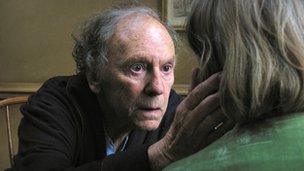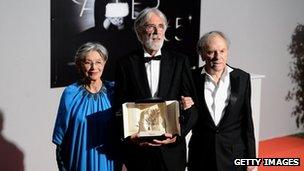Hollywood feels the love for Haneke
- Published

The film won Haneke his second Palme d'Or in four years
Austrian film-maker Michael Haneke's latest film, Amour, has already won the Palme d'Or at Cannes, as did his previous film, The White Ribbon.
Amour is now nominated for five Oscars, including best film, best director and best actress for Emmanuelle Riva.
The French-language film is about an elderly middle class French couple who enjoy a cultured life until Anne suffers a stroke and begins to lose her speech and bodily functions.
Here, Haneke talks to Mark Lawson of Radio 4's Front Row.
The acting style in this film, and many of your others, is very naturalistic. Do you allow or invite any improvisation from the actors or is it very strongly scripted?
In my case it's very much all scripted, I'm not a great fan of improvisation to be honest. I think if you have a particular optical form that you're trying to strive for, then improvisation doesn't work in that context for me. Eighty per cent of filmmaking in my opinion is preparation and then the rest is, of course, work with the actors. In my case, that has never involved improvisation. But that doesn't mean they don't bring their own ideas and their own personalities to the roles that they play.
One of the issues in Hollywood is that films are sometimes not rehearsed at all - the actors just turn up and shoot them. It seemed to me, watching your films, that a great deal of preparation has gone into the performances before you shoot them.
No, I think that's, in principle, a mistake. I don't rehearse anything at all. Of course I would if I'm working with children or if I'm working with amateurs. But when I'm working with professional actors, I presume that they've read and understood the script. And what then comes is the practical work on the set - so you're going to sit here, you're going to take a glass at this particular moment and then of course when we do it we make certain corrections and then we shoot. And it will depend, it could be the very first take that is the right one or the 20th take that works. But I don't engage in any sort of discussion about it in advance or any kind of preparation.
If the people have been correctly cast, then it's not the kind of opinion that they bring to the part, but how they react to a particular situation, a particular given moment in the film and I think that's best when it happens spontaneously and isn't directed in advance.

The film was a
The subject matter of love and the theme of euthanasia - many people seeing the film will read things into it. Do you have an attitude towards assisted dying or do you wish to leave it to the viewer to conclude?
Well, first I don't think euthanasia is one of the principle themes of this film. For me, what mattered here was the question of how to deal with the suffering of a loved one. And secondly, of course, in the context of euthanasia, I do have my own position about that. But Michael Haneke's opinion on this isn't really very important. What matters is that the audience develop their own opinion in relation to this, rather than I instil opinion in them.
And on that point, the title of the film is very important - when people see the word love, they think romance and this is a romance, but you're showing love at its extremities.
Obviously if I'd made a film about an everyday relationship between a couple, I wouldn't have called it love, that would have been entirely the wrong title. I should also add most importantly that the title isn't mine in any case. I came up with a series of titles but, as far as I was concerned, none of them worked. And so one day I was having lunch with Jean-Louis Trintignant and I told him all about these titles that weren't working. And he said simply, "well, if it's dealing with love, why don't you call it that?" And in any case, I particularly liked the contrast between the title and then the kind of thing the film deals with.
The positioning of the camera, which is something very much associated with you - was there a eureka moment when you thought, "this is how I want to move a camera" or did it develop through experiment?
Of course any style is a result of a lot of different influences that are out there, also a certain set of aesthetic considerations, and it's certainly not by chance that my films look the way they do.
Many film directors have talked about the difficulty now, particularly in the recession, in raising money to make independent films. British director Mike Leigh has said it's as if each time he's never made a film before and he's asking people for money. Do you recognise that struggle?
It is certainly the case if you have complex material it can be very difficult. The White Ribbon is a good example. I wrote the script for that 10 years before. It took a very long time to finance that one. But the more successful you are, of course the more chances you have. In my case, I certainly can't complain. Not least, of course, because I can work in two languages, which means I can get funding from Germany and France as well.
Although your films are very different from each other, in many cases there is a central couple who are put under pressure. I assume that, as in all fiction, a relationship is a fascinating starting point because it can either become stronger or weaker - there is inbuilt conflict there.
I think it's undoubtedly the case that the couple is the key unit in our society and, for that reason, it offers a particular sense of identification for the audience. And of course it's a couple in a bourgeois mille because that's the one that I know and that's the one I can therefore explain and portray.
Do you receive offers from English language cinema? Do they say come and make the new James Bond film or come and direct Julia Roberts in a rom com? Or do they know not to ask?
Well, they certainly don't come to me for the next James Bond film, that's for sure. But I do get many offers which are way off target and make me think, "why on earth do they come to me in the first place?"
Have you ever been tempted?
Not really!
This interview originally appeared on Front Row in November 2012.